In more than three decades of investing in the stock market, both as a private investor and as a professional stock portfolio manager, I have successfully learned how to do so with no greater stress and worry than that of raising a family, paying regular mortgage payments, and trying to stay healthy as the years fly by. Investing in the stock market should not be any more stressful than other obstacles we face in life, such as our health, our family relations, and meeting our various financial challenges.
Strangely enough, Wall Street institutions and the financial media disseminate all their public communications as if the stock market is different from other types of investment. They treat it more like casino gambling than real estate investing, owning a small family business, or simply managing the finances of one’s household. But, that’s exactly what stock investing should really be about.
Why is there so much stress when the stock market goes down? When you go food shopping, do you lose sleep when there’s a sale on fresh fruits and vegetables, or on cereal, or coffee, or ground beef? Everyone cheers when there’s a drop in prices at the gas pump. These items are staples that we shop for regularly. Well, if you think about it, buying stocks or mutual funds for your retirement 401(k) fund is also a staple that our employers allow us to invest in regularly, each time we receive a paycheck. When stock prices go down, that means you can buy more shares in your retirement plan, for the same amount of money deducted from your paycheck. Isn’t it silly to get stressed over that good news?
The financial media and most Wall Street institutions encourage us to keep buying and selling. Buying and selling! But, what if you owned a real estate income property, maybe a duplex or fourplex, or perhaps a family business, such as a neighborhood restaurant? Would you be constantly buying and selling that investment? I think not. You would probably rely on the monthly rental income or regular net income from whatever type of investment you operate, knowing it would, in the long run, probably grow.
With stock investment, the regular income you generally experience is known as dividends. In most cases, the annual income percentage of dividends is small: maybe 2%, 3%, or 4%. But, with stock investing, there are none of the headaches of vacancy factors or labor-management that accompany the operation of small business. With stocks, you are separated from all corporate management responsibilities, and federal law protects you against fraudulent activity.
If you can accept the idea of investing in quality stocks or mutual funds that manage portfolios of such high-quality stocks, this is the beginning of reducing the stress related to stock market investing.
Realistically, there are numerous stocks traded on the stock exchanges that do not represent well-run businesses, just as there are numerous franchise opportunities that are not as lucrative as MacDonald’s or Cousins Maine Lobster. It requires a diligent amount of research, either by you or with the help of experienced financial advisors, to uncover well-managed corporations, the stock in which you’d be wise to invest.
I have embarked on writing my third book, the theme of which I call “true value investing”, which will address in detail my view of good business-like investing. Stocks which potentially meet my “good value” criteria will be those which are publicly traded and are accessible by investors with brokerage accounts at any Wall Street firms.
In summary, investing in stocks representing high-quality companies that distribute regular dividend payments to shareholders is similar to running a small personal business. Holding on to your investments for several years and buying more of the same stock when opportunities arise, and not constantly buying and selling, can substantially reduce the stress of stock ownership. The key is that you are resisting the urge to buy and sell based on news reported by the financial media. Instead, you are acting like a business owner, looking for dividend payments, and perhaps increasing your “inventory” (the number of shares) when lower prices present themselves. Keep in mind, just because the stock market it goes down, it does not mean that the company whose stock you own has turned bad.
Understanding that you can treat your stock ownership as if you are investing in a family business and that you are in it for the long haul should allow you to feel less stress and worry about your investment in the stock market.








